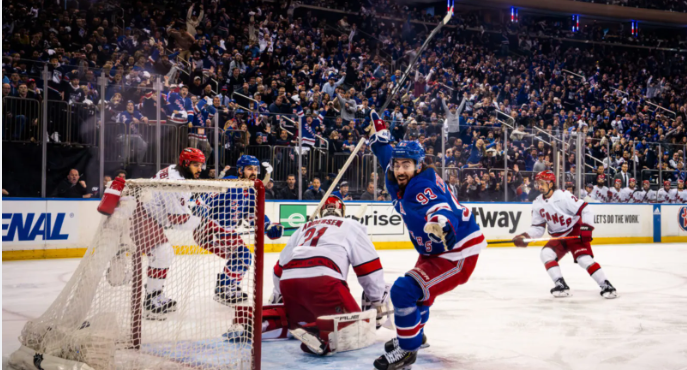As the new season begins, one of the primary concerns for the New York Rangers is whether Mika Zibanejad can recover after a significant decline in his performance during the regular season and an even worse showing in the playoffs. Unfortunately, the early signs indicate he has yet to regain his form, continuing to struggle. For the Rangers to have any hope of winning the Stanley Cup this year, Zibanejad must quickly return to his former level of play, as his current performance is more of a liability than a benefit to the team.
Since the 2023 Stanley Cup Playoffs, Zibanejad hasn’t appeared to be the same player. In the 2022-23 regular season, he had an impressive offensive year, scoring 39 goals and totaling 91 points, suggesting he would be a key contributor during the playoffs. However, he fell short in the series against the New Jersey Devils, tallying only one goal and four points in a seven-game series, marking the start of his struggles. Despite his solid defensive contributions and effectiveness on the penalty kill, his primary role is scoring, which he could not fulfill during that series. Many initially believed this was just a temporary setback, but he has yet to reclaim his previous prowess.
Last season saw Zibanejad’s production drop significantly, from 39 goals and 91 points to just 26 goals and 75 points. A key issue was his poor performance at even strength—only 12 of his goals came at even strength, and he went through a 30-game goalless drought. Such a slump was alarming for a player of his caliber. Hopes were high for a turnaround in the playoffs, but he ultimately fell short, finishing with 16 points in 16 games, including only three goals and a 10-game goalless streak that left him ineffective against the Florida Panthers in the Eastern Conference Final. This performance raised questions about whether he can still be considered a top-tier center in the NHL.
This season, Zibanejad has started off poorly yet again, managing just two goals (including one empty-net goal) and seven points through nine games. He is currently being outperformed by the Rangers’ third line and receiving less ice time than other players, including Filip Chytil, Will Cuylle, and Kaapo Kakko. Zibanejad has expressed frustration about his reduced playing time, noting he used to average over 21 minutes but has dropped to 18 this season. Although he is dissatisfied with this change, his on-ice performance hasn’t warranted a return to those minutes, as other players are surpassing him in effectiveness. For Zibanejad to reclaim his ice time, he needs to elevate his impact on the game; right now, he appears to be merely going through the motions.
While the Rangers are set to be a competitive team again this season, many fans believe the playoffs will ultimately dictate the success of the year. To be genuine contenders for the Stanley Cup, they need the Zibanejad from two seasons ago, a dynamic offensive player, rather than the version they have seen recently—essentially a non-factor in games. Change is necessary, and it needs to occur swiftly.
